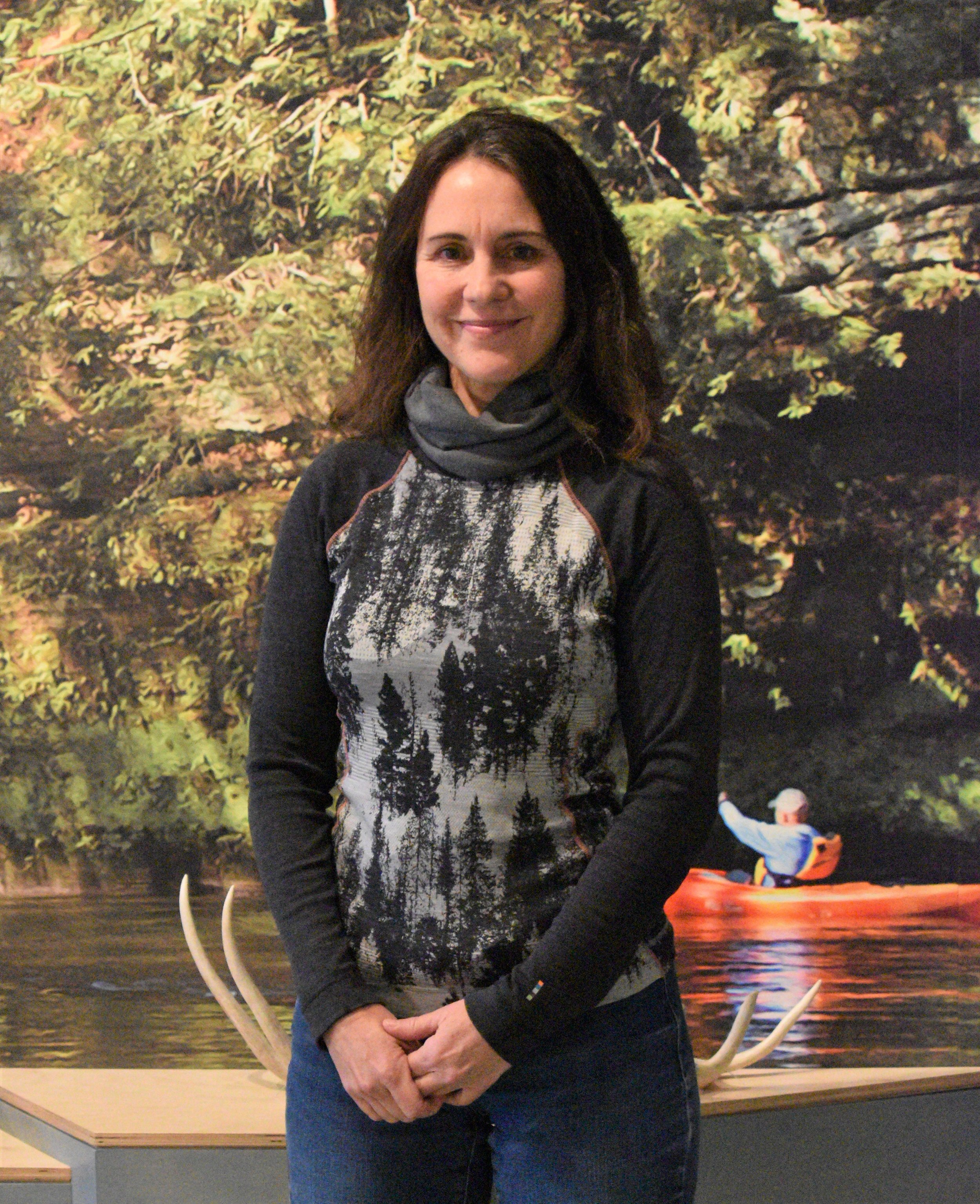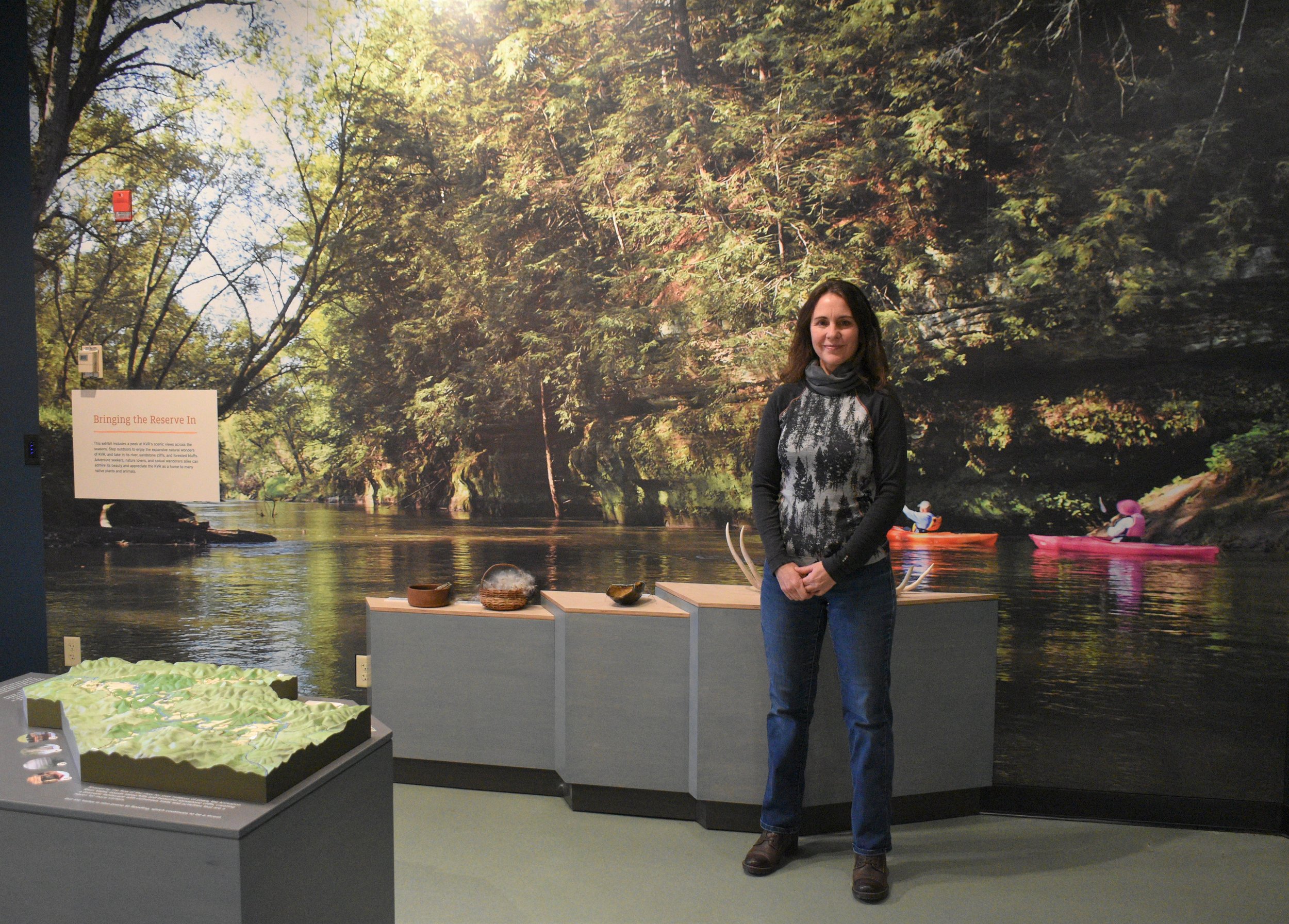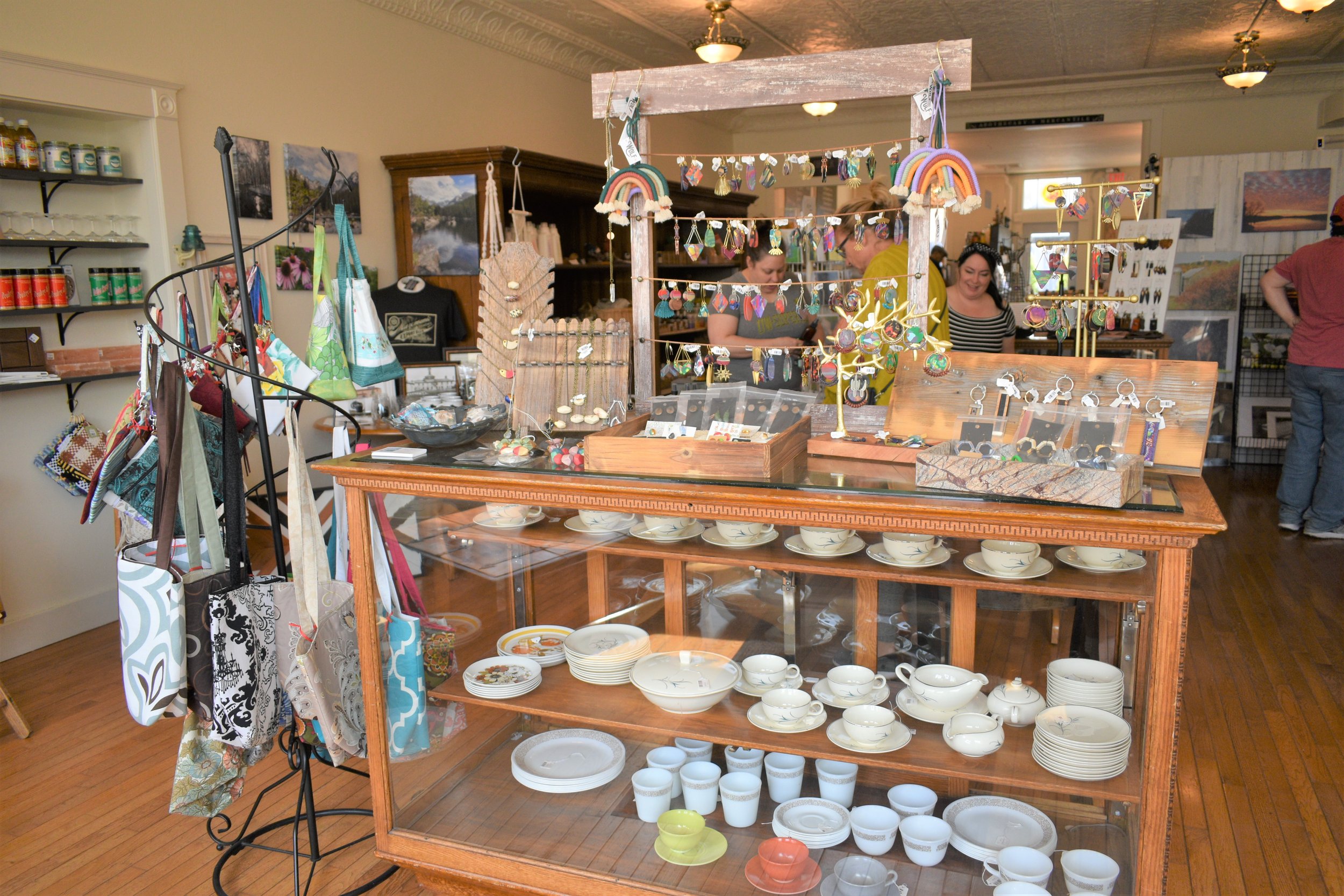Kickapoo Valley Reserve welcomes new Executive Director
On November 21st, the Kickapoo Valley Reserve (KVR) located just outside of LaFarge, Wisconsin, welcomed its new Executive Director, Lynn Kronschnabel.
Currently living in the Viroqua area, Kronschnabel grew up in rural Manitowoc County, the youngest of six kids. She recalled their property only consisted of a few acres, but said they were fortunate enough to live next to, as she put it, “a pretty large chunk of wooded land”, and “had access to a lake called Kasbaum.” Their neighbor with that big chunk of land was a retired lawyer. “I think he had 150 acres or so. We had free access to his land. And there was another lake, Glomski Lake that was about a half mile away with some wetlands in between to explore.” Kronschnabel said she had the pleasure and luck to be a child that was just sort of set free in nature. Admittedly, most of her time was spent exploring in the woods and climbing trees. “We always had at least one rowboat and I would build rafts. I remember that a dugout canoe was found in the wetland back in the 70s, a Native American canoe that was then taken off to the historical society.” Kronschnabel feels that her early upbringing in nature, learning about trees and her fascination with plants, a sort of ethnobotany before she knew what that meant, was the catalyst for her career later in life.
When she turned eighteen, she moved to Milwaukee to study art and art history which led into studying anthropology. “It was just really an exciting time for me living in Milwaukee, expanding my horizons and knowledge and I was fascinated with studying cultures around the world. Specifically, I was at the same time I worked at the Milwaukee Public Museum and I did an internship in African anthropology, looking at artifacts, cultural artifacts, and doing some research on their uses.” In the duration, Kronschnabel was also taking a lot of non-western art courses trying to understand the whole idea of museums and taking artifacts out of their cultural reference. At some point she decided that was not for her, taking functional objects out of their cultural context and setting them up in a museum or college.
While at UW-Milwaukee, she became a teaching assistant for John Boatman, who started the Native American studies program teaching American Indian Studies and Ethnic Studies at the University for 32 years. “He's Me’tis, Ojibwe and Menominee (Native American). I taught for him for a couple semesters. I took all of his courses that I could. They were titled Great Lakes American Indian philosophy and ethnobotany. So that took me back into my interest in botany and ethnobotany. I guess it was right at the end of college that I decided I really wanted to be in natural resources. I started exploring areas around Milwaukee and hiking the Ice Age trail and I applied for a job with the Milwaukee County Parks. I realized Milwaukee was really a significantly green space with natural corridors along Lake Michigan and the river, and I realized what a treasure the Milwaukee County Park system was.”
So, Kronschnabel landed a job as a seasonal employee at the golf course in Brown Deer Park. She noted the park had really nice trails in the woods, ponds, and was one of those historic Milwaukee parks. “I just I loved the work and I think that I kind of got bitten by that park and rec and natural resource bug.”
After working a couple seasons at the park, Kronschnabel heard about the Wisconsin Youth Corps (WYC) which was a program she knew existed, where young people would live at a state park for a summer and participate in different kinds of conservation and perform trail work. “I had remembered back in maybe about 1976 my brother did a summer at Wyalusing State Park. I remember picking him up at the end of summer and he had all these great stories of hanging out over the bluffs, trimming shrubs and woody growth off of the bluffs, and what a great time all those kids have learning about nature doing conservation work.” Enthused by her brothers experience with the WYC, Kronschnabel eventually found herself being hired as a crew leader for the Wisconsin Conservation Corps., working in the Milwaukee County Park system leading up a project in Grant Park. “It was really one of the best years of my life professionally. We worked in all the elements renovating a sort of Works Progress Administration era trail that was down in a deep ravine along Lake Michigan.
Eventually, Kronschnabel was hired as a full-time park maintenance worker and worked the next couple years learning all aspects of park maintenance, learning to drive tractors receiving her CDL and pesticide license and just became as well rounded as she could in the park system. She quickly realized management is what she really wanted to do.
She eventually worked her way up to working at Grant Park as the unit manager, overseeing an area of about 2400 acres in the main parks along Lake Michigan. It was her dream job managing two different state natural areas and lots of recreation that urban parks offer; athletic fields, paved bike trails, ice skating rinks, cross country skiing in the winter to name a few.
Ultimately, she and her husband were expecting, a big life change for her. “I decided to leave my career and moved out to this part of the state (the Driftless Area). We bought some property near Wildcat Mountain State Park. It was tough to leave my career. It was like, sort of devastating to me on that level to give up that career. So, I focused on being a mom for several years.”
But Kronschnabel did not stay idle for very long. She said she always had been interested in entrepreneurship, and along with her husband, started a business called Fizzeology, a fermented food business. “We started that out sort of at our farm on property that we had bought in Monroe County. We became a pretty prominent local regional business and then started another chocolate making business called DelSol Chocolate.”
But Kronschnabel said she really missed working in the parks and natural resources. She said her friends and family would always be annoyed with her while out say on a hike at a local park. She would be giving all her ideas and assessments and complaints like, “look at this unsafe bridge, and this trail this could be so much better.” She stressed it’s just sort of in her blood and it's how she thinks of her service in a way to humanity, creating beautiful safe spaces, natural spaces for the animals, the plants, and protecting them for people to enjoy. “I always felt like I wanted to get back into natural resources, but I was really settled in and committed to living in Viroqua, because it's a place where I really found community and home.”
One day, Kronschnabel saw a job posting by the Wisconsin Department of Natural Resources (WDNR). They were hiring Rangers. She applied and was hired. “It was a pretty competitive process. I think they hired 33 Rangers around the state at that time and so I got hired for a new program called Recreation Operations. My job was not the typical Ranger focused at the state park, but covering state lands that are outside the parks department. So, state fishery land, state wildlife, state natural areas, and boat accesses. For five years, I worked in that capacity for the WDNR managing mostly public access and maintenance at properties throughout six counties in this Driftless region, all the way west to the Mississippi. North to the Sparta area, and East, pretty much to Devil's Lake South to the Wisconsin River. Kronschnabel said it allowed her the opportunity to work with wildlife biologists, fisheries biologists, conservation biologists, and park personnel, to really have a broad sense of Land and Resource Management, and learn the different watersheds. “I feel like I've been down almost every road possible and really gotten to know the streams really well. I loved the work with the WDNR, and the level of professionalism. I've spent a lot of time out of Wildcat the last five years, my office was based there. Then, of course, became more familiar with the Kickapoo Valley Reserve. Driving through it every day, seeing it through all the seasons and myself, recreating more here over the past few years.”
Long serving KVR Executive Director Marcy West was retiring from her position which opened up the position. “I tried to remember how I even heard of this opening because I wasn't really watching, like job announcements. I was pretty happy in my WDNR job. There was not a lot of room to move up in this part of the state with the WDNR in my position. I was so committed to living in Viroqua at least until my son grows up, not wanting to move away to take another DNR job somewhere around the state. Somehow, I heard about this position. It wasn't something that I had ever even thought about in the past because, I mean, Marcy was here for so long. I decided, like wow, I actually have a really good background for this. This is a really exciting opportunity.” Long story short, she was hired as the new KVR Executive Director.
Kronschnabel said she is very enthused about her position saying, “KVR is an amazing and vast property made up of 8600 acres of really high-quality environments and natural areas. Getting to know the land and the unique features here is very exciting to me. Another aspect that I'm looking forward to is more Hoocąk (Ho-Chunk) involvement and maybe refining what that means, this co-management with the Hoocąk. I think it's really exciting that with these new exhibits (in the visitor’s center), we are able to draw more attention to the people that were here for 1000’s of years in this area. Seeing their language and more Hoocąk representation in the exhibits is really a great start, but I’m really hoping to see more joint events and more education centered around their culture and language and more adult education being brought into the mix.” Kronschnabel is also committed to continuing KVR’s other focus of education for all ages, the summer camps for kids, and continuing Driftless Dialogue, a monthly presentation series covering a wide range of topics relating to the Kickapoo Valley people, history, and natural surroundings. But of course, she has a prime focus on managing the natural resources in the reserve.
“I'm really excited to get to know all the staff. There are people that have been here for up to 20 years, I've spent time with each of them so far and all are super dedicated and passionate about their pillar, whether it's education, land management, or special events. It's exciting that there's so many dedicated people that I can learn from and there's also an opportunity to bring new people in. We have a new education coordinator right now on contract, she just started today. We're planning on filling that position, a full-time position, within maybe two to three months. So that position will be posted and opened up, so there's room for somebody to start creating new educational opportunities in addition to what's already been done here.”
Kronschnabel will be bringing back the Master Naturalist Program, a program that was originally set up by Jonel Kiesau. “She was the Education Coordinator. Now, she's just with the Forest School (a new charter school within the LaFarge school district). The Master Naturalist program, I think, was sort of on hiatus because of COVID. We're hoping to start that up this summer and get in a large group of people that can be trained as Master Naturalists and then have a pool of volunteers to draw from for nature, education and environmental studies.”
Land management unique to this area and learning about the prairie restorations are important to her being a very hands-on sort of manager. “I mean, same thing, when I was with the Milwaukee County Parks, I like working with the crew at times really being involved in all aspects of the property.”
All of Kronschnabel’s job experiences she said, definitely prepared her for, and plays an important role as Executive Director of the Kickapoo Valley Reserve., leaving no doubt the reserve will continue to flourish under her direction.






